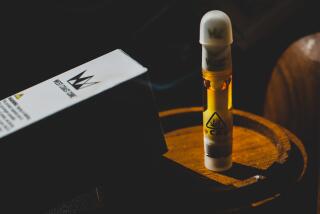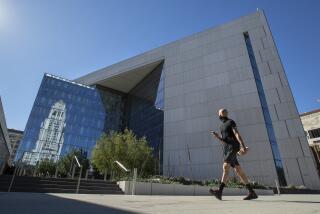Crime Lab at LAPD Wins Accreditation
After spending millions of dollars to restore its credibility and improve its ability to analyze evidence, the Los Angeles Police Department’s much-maligned crime lab has received national accreditation, LAPD officials announced Wednesday.
The long-sought accreditation places the LAPD’s crime lab among the country’s top facilities, city officials said.
Established in 1923, the LAPD crime lab was the first such laboratory in the nation. Although it was a cutting-edge facility for many years, the lab’s reputation took a severe beating several years ago during the O.J. Simpson murder trial when defense attorneys attacked the quality and professionalism of the lab’s work.
That trial helped shed light on the lab’s antiquated equipment and its criminalists’ tremendous workloads.
“Poor equipment, inadequate facilities and insufficient personnel are all unacceptable and were in need of remedy,” said City Councilwoman Laura Chick, chairwoman of the Public Safety Committee.
“The lack of accreditation gives the perception that the laboratory is incapable of meeting minimum standards, and perceptions matter,” added Chick, who attended a news conference at LAPD’s Piper Technical Center with other city officials hailing the accreditation.
Mayor Richard Riordan, who has made it a priority of his administration to better equip the lab, said the “public deserves nothing less” than an “elite” facility.
About one-third of all U.S. laboratories are accredited. In California, seven of the 19 county and municipal labs are accredited, authorities said.
The Los Angeles County Sheriff’s Department’s crime lab was reaccredited several years ago. Both the LAPD lab and the sheriff’s lab are accredited by the American Society of Crime Laboratory Directors. The accreditations are good for five years.
On Tuesday, the Board of Supervisors moved to merge the LAPD’s and the sheriff’s crime labs, a cost-saving method recommended by the grand jury. The Los Angeles City Council would need to approve the merger before it could occur.
Since 1995, the LAPD has added 32 employees for the lab, spent about $500,000 on new training programs, and invested about $3 million in facility and equipment upgrades. Those upgrades ranged from smoke alarms and emergency eye-wash stations to high-tech equipment used for analyzing DNA and identifying drugs in blood and urine.
Each year, the lab technicians and criminalists working in white coats handle hundreds of thousands of pieces of evidence, testing everything from ballistics to hair and fiber samples.
“We have some of the most talented and dedicated individuals working in our labs, and they deserve recognition for this accomplishment,” said Cmdr. Dave Kalish, the LAPD’s spokesman.
Criminalists at the LAPD lab have historically faced heavy workloads. Even today it can take months to analyze blood and bullet casings.
LAPD officials said there is still work to be done, citing a need for larger facilities.
“Our crime lab must be top notch, certified to the hilt and equipped with the best in technology,” Chick said. “I never want to hear about a criminal case where a defendant has grounds to question the validity of tests provided by the Los Angeles city crime lab.”
Times staff writers Nicholas Riccardi and Rich Connell contributed to this story.
More to Read
Sign up for Essential California
The most important California stories and recommendations in your inbox every morning.
You may occasionally receive promotional content from the Los Angeles Times.









